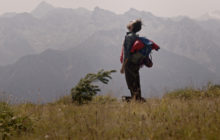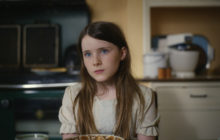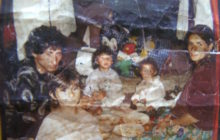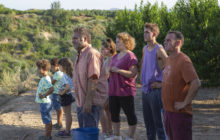From Reality and Literature: From the Life of Empress Sisi to the Adaptation of the Literary Meditation on Mountains
13. October
Whether they cast new light on stories on historical figures or bring touching narratives about growing up, family and friendship to the film screen, several titles from this year’s program bring stories based in real life or famous literary works.
The Eight Mountains, the spectacular drama by Felix van Groeningen (Alabama Monroe, Beautiful Boy) and Charlotte Vandermeersch awarded with the Jury Prize in Cannes, owes its story to the novel of the same title by Paolo Cognetti, a celebrated Italian writer whose novels are based on the experience of living in the mountains. The novel of the same title (The Eight Mountains, Fraktura, 2018) is a meditation on friendship and nature, on fathers and sons. It was translated to more than forty languages and the numerous awards it won was the Italian Strega, the French Prix Médicis, and the English Pen Award. The film’s protagonists, the 11-year-old shepherd Bruno and the city boy Pietro are bound by the unbreakable friendship which began one magical summer in the Alps. Over the years, their life paths have diverged. Bruno will stay loyal to his mountain, while Pietro will travel the world, directing documentary films. But he will always return to the quiet mountain refuge of his childhood.
Irish author Colm Bairéad’s first feature film, the classic drama The Quiet Girl from this year’s feature competition, is based on a literary work, Claire Keegan’s popular story, first published in the New Yorker. The film is set in rural Ireland in 1981 and follows Cáit, a quiet and withdrawn girl from a poor and overcrowded family. While her gambling father consistently neglects the children and the farm, her pregnant mother is overwhelmed by worries and chores. When her mother’s cousin suggests Cáit spend the summer with her and her husband, Cáit’s father gladly accepts the offer. Amidst the lush greenery of the Irish countryside, Cáit blossoms nurtured by Eibhlín’s tenderness and care.
Several films from this year’s program are based on (auto)biographies. Corsage, the historical drama about Empress Sisi directed by Marie Kreutzer (The Fatherless – ZFF 2011), tackles the sterile and kitschy legend of the fascinating Empress in order to offer a more honest and nuanced insight into her life. Vienna 1877. Empress Elisabeth (Vicky Krieps – Phantom Thread) turns 40. Bold and stubborn, Sisi is far from the public image of the gentle and demure favourite of the people. Bogged down by anxiety, obsessive rebelliousness and frustration with her public image and political role, Elisabeth sets herself increasingly demanding physical challenges and takes frequent trips around Europe due to her restlessness.
In the intimate autobiographical documentary Me, My Gypsy Family and Woody Allen, which was awarded the Golden Pram for Best Documentary at the 2010 ZFF, director Laura Halilović turns the camera to her own family. The 19-year-old Roma girl Laura should be married by now. But she has other plans. Since she was a little girl, she has dreamt of being a film director like her idol Woody Allen, and she is determined to make her dreams come true. Combining scenes from daily life with the family’s archival footage, she reveals to us a little-known world that rarely opens up to strangers.
Although not autobiographical, Alcarràs by Carla Simón, Spain’s entry for this year’s Oscars and the first Catalan film to win the Golden Bear for best film at Berlinale, is inspired by the story of the director’s family who, like the Solé family in the film, grew peaches in the Catalan village of of Alcarràs. When my grandfather died, my uncles inherited the land and its care. Grief for my grandfather brought me to value my family’s legacy and their dedication to farming. I learned to appreciate the trees they cultivate as something that could someday be destroyed. This is how the plot of Alcarràs came to me: a family of farmers – the Solés – are about to lose their peach trees as the owner wants to put solar panels in his fields… But the truth is that the story of the Solé family comes at a time when this way of agriculture is no longer sustainable. There is the real question of what agriculture means to us today. We wanted to pay a nostalgic, but unsentimental tribute to the last resistant families of farmers still hanging on to their traditions, Simón said.








